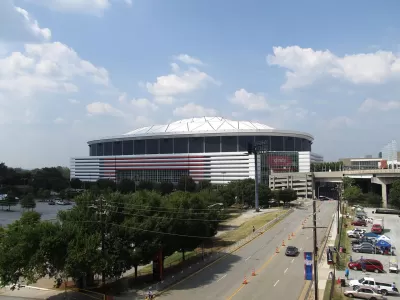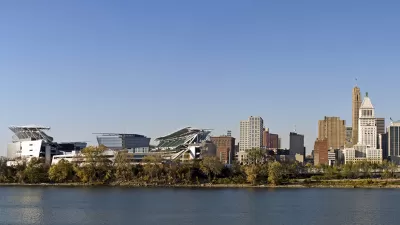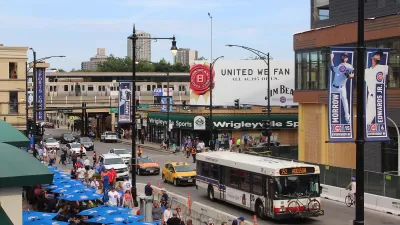In Atlanta—and throughout the country—city politicians have proven willing and eager to support stadium construction. But though these facilities are marketed as economic drivers, they often cause steep declines instead.

Stadium construction often depends on public funds and a good dose of city pride. "And yet the consensus among economists says that the public rarely profits from these massive investments, despite persistent claims by politicians and heads of chambers of commerce that stadiums and their ilk generate economic growth."
Atlanta's history of public investment in stadiums calls their "benefits" into question. "In Atlanta, four stadiums––two for baseball and two for football––have [...] actually contributed significantly to the de-development of what were once thriving middle and working class Black communities."
Lacking political visibility, communities around planned stadiums find it difficult to oppose the projects. The Atlanta-Fulton County Stadium, for example, was "paid for with parks and recreation tax dollars and built on land taken from owners through a federal urban renewal program. Construction of the Atlanta-Fulton County Stadium wiped out an entire neighborhood [...]"
When a new stadium appears, the surrounding neighborhood can become mere support structure. "Even after construction was completed, many people were displaced as landlords found it more profitable to evict families, tear down houses, and operate ad hoc parking lots where homes used to be. And once construction jobs dried up what was left were low-paying service industry jobs."

Alabama: Trump Terminates Settlements for Black Communities Harmed By Raw Sewage
Trump deemed the landmark civil rights agreement “illegal DEI and environmental justice policy.”

Planetizen Federal Action Tracker
A weekly monitor of how Trump’s orders and actions are impacting planners and planning in America.

Why Should We Subsidize Public Transportation?
Many public transit agencies face financial stress due to rising costs, declining fare revenue, and declining subsidies. Transit advocates must provide a strong business case for increasing public transit funding.

Understanding Road Diets
An explainer from Momentum highlights the advantages of reducing vehicle lanes in favor of more bike, transit, and pedestrian infrastructure.

New California Law Regulates Warehouse Pollution
A new law tightens building and emissions regulations for large distribution warehouses to mitigate air pollution and traffic in surrounding communities.

Phoenix Announces Opening Date for Light Rail Extension
The South Central extension will connect South Phoenix to downtown and other major hubs starting on June 7.
Urban Design for Planners 1: Software Tools
This six-course series explores essential urban design concepts using open source software and equips planners with the tools they need to participate fully in the urban design process.
Planning for Universal Design
Learn the tools for implementing Universal Design in planning regulations.
Caltrans
Smith Gee Studio
Institute for Housing and Urban Development Studies (IHS)
City of Grandview
Harvard GSD Executive Education
Toledo-Lucas County Plan Commissions
Salt Lake City
NYU Wagner Graduate School of Public Service





























